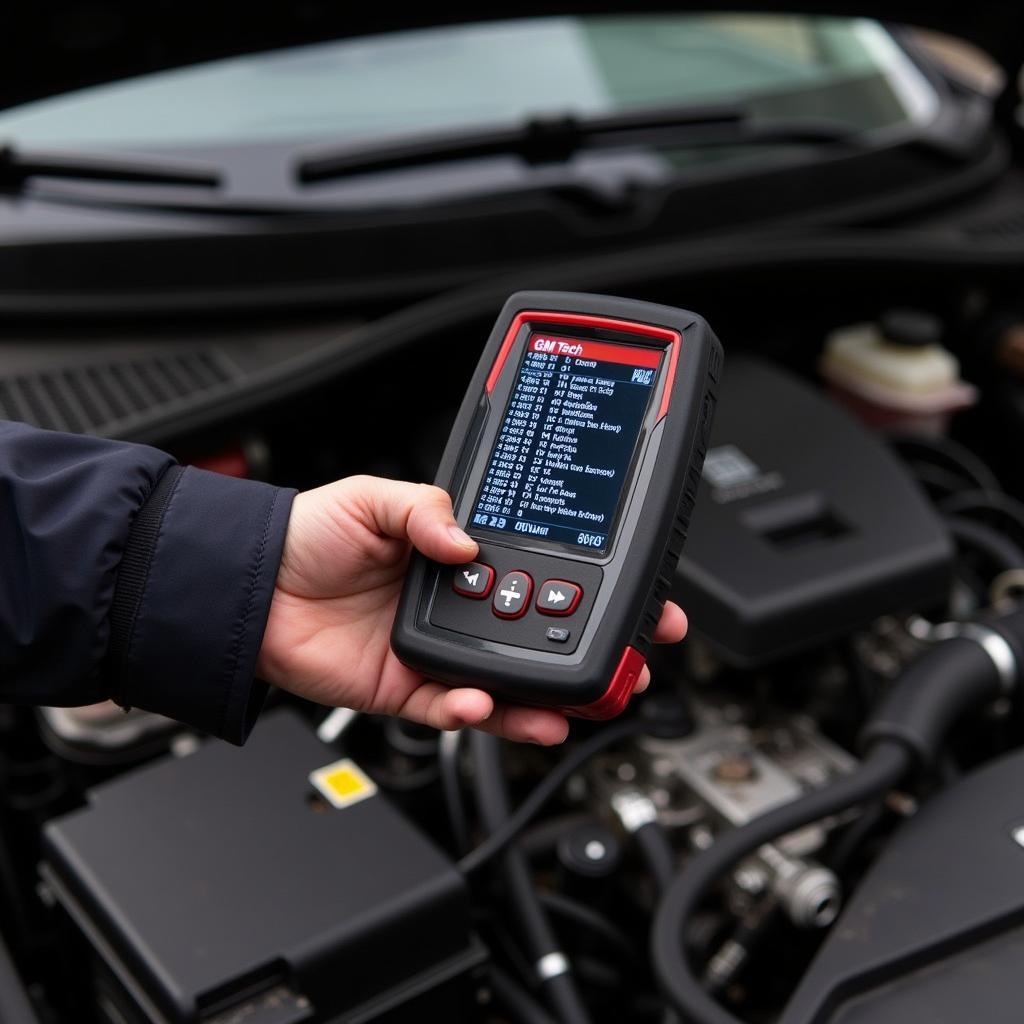A Genesis car scanner is an essential tool for any owner, mechanic, or enthusiast looking to delve deeper into their vehicle’s inner workings. These sophisticated devices act as a window into your car’s computer system, revealing hidden data and diagnostic trouble codes (DTCs) that provide valuable insights into its health and performance.
Why You Need a Genesis Car Scanner
Gone are the days of relying solely on mechanics for even minor issues. With a Genesis car scanner, you empower yourself to:
- Diagnose problems quickly and accurately: Identify the root cause of warning lights or performance issues without relying on guesswork.
- Reset check engine lights: Once you’ve addressed the underlying issue, easily clear the warning light yourself.
- Monitor live data streams: Observe real-time sensor readings to analyze your Genesis’s performance and identify potential problems before they escalate.
- Customize vehicle settings: Some scanners allow for personalized modifications, such as adjusting lighting preferences or automatic door locking.
- Save money on repairs: By understanding the problem beforehand, you can approach mechanics with confidence and potentially avoid unnecessary expenses.
Choosing the Right Genesis Car Scanner
Selecting the appropriate scanner can feel overwhelming with the vast array of options available. Consider these factors to make an informed decision:
1. Compatibility: Ensure the scanner explicitly states compatibility with Genesis vehicles, including your specific model and year.
2. Functionality: Determine your desired level of detail. Do you need basic code reading capabilities or advanced functions like live data monitoring and bi-directional control?
3. User Interface: Opt for a scanner with an intuitive interface that aligns with your technical expertise. Consider factors like screen size, menu navigation, and data presentation.
4. Price: Establish a budget beforehand, as prices can range significantly based on functionality and features. Remember that investing in a quality scanner can save you money on repairs in the long run.
5. Brand Reputation: Choose reputable brands known for reliability, accurate readings, and excellent customer support.
[image-1|genesis-car-scanner-types|Genesis Car Scanner Types|A split image showcasing two different types of Genesis car scanners: (1) A basic handheld OBD2 scanner plugged into a car’s diagnostic port. (2) A professional-grade scanner with a large screen displaying detailed diagnostic information.]
Understanding the Different Types of Genesis Car Scanners
-
Basic OBD2 Scanners: These affordable and portable scanners primarily read and clear basic engine-related trouble codes. They are ideal for DIY enthusiasts seeking to understand and address simple issues.
-
Bluetooth Scanners: These compact devices connect wirelessly to your smartphone or tablet, offering a convenient and portable solution. They typically come with dedicated apps that provide a user-friendly interface and often allow for data logging and sharing.
-
Professional-Grade Scanners: These advanced tools offer comprehensive functionality, including live data monitoring, bi-directional control, and access to manufacturer-specific codes. They are typically used by professional mechanics and experienced DIYers.
Maximizing Your Genesis Car Scanner
To fully leverage your scanner’s capabilities:
-
Familiarize Yourself with the User Manual: Understanding the specific features and navigation of your chosen scanner is crucial.
-
Locate the OBD2 Port: The port is typically located under the driver’s side dashboard, near the steering column.
-
Connect the Scanner and Turn on the Ignition: Ensure the vehicle is off before plugging in the scanner. Then, turn the ignition to the “on” position without starting the engine.
-
Follow On-Screen Prompts: The scanner will guide you through the process of reading or clearing codes, accessing live data, or utilizing other features.
-
Interpret the Results: Understanding the meaning of the codes or data displayed is essential for effective troubleshooting. Consult online resources, repair manuals, or seek professional assistance if needed.
[image-2|genesis-car-scanner-in-use|Using a Genesis Car Scanner|A mechanic using a professional-grade Genesis car scanner to diagnose an engine problem in a Genesis vehicle. The scanner screen displays diagnostic codes and live data readings.]
Common Genesis Trouble Codes and Their Meanings
Here are a few common trouble codes you might encounter:
-
P0420: Catalyst System Efficiency Below Threshold (Bank 1) – Indicates a potential issue with the catalytic converter.
-
P0171: System Too Lean (Bank 1) – Suggests the engine is receiving too much air or not enough fuel.
-
P0300: Random/Multiple Cylinder Misfire Detected – Indicates a problem with one or more cylinders not firing correctly.
-
U0100: Lost Communication with ECM/PCM – Suggests a communication error between the engine control unit and other modules.
Remember, these are just a few examples, and numerous other codes exist. Always refer to a reliable source for accurate code definitions and troubleshooting advice.
Get Expert Help with Your Genesis
Still, have questions or need help diagnosing a tricky issue? ScanToolUS specializes in automotive diagnostic tools and software, including a wide selection of Genesis car scanners. Our team of experts can help you find the perfect scanner for your needs and provide guidance on using it effectively.
Contact ScanToolUS today at +1 (641) 206-8880 or visit our office at 1615 S Laramie Ave, Cicero, IL 60804, USA.
By utilizing a Genesis car scanner and arming yourself with knowledge, you can approach vehicle maintenance with greater confidence and keep your Genesis running smoothly for years to come.


Pingback: Demystifying the Car ECM Scanner: A Comprehensive Guide - Car Scan Tool